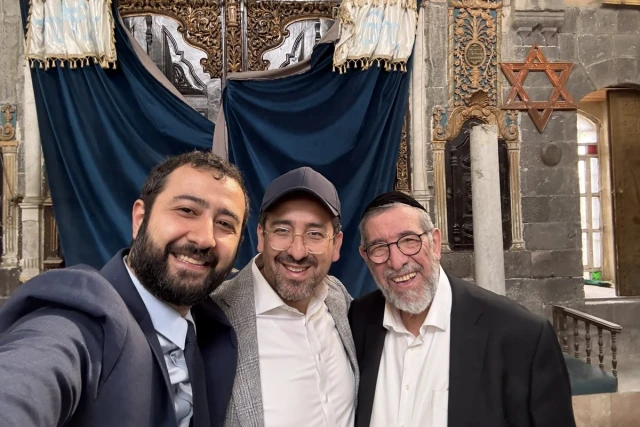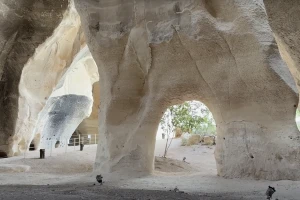Jewish rabbi runs in first Syrian parliamentary elections since Assad regime fell
Cautious steps toward democracy: 1/3 of candidates appointed by President Sharaa

On Sunday, Syria conducted its first parliamentary elections since the fall of the Assad regime, as the government of interim President Ahmad al-Sharaa is taking cautious first steps toward the appearance of a democratic system in the country.
For the first time in almost sixty years, a Jewish candidate, Syrian-American Rabbi Henry Yosef Hamra, also ran for a seat in the People’s Assembly in the Damascus district. Jews had been banned from political office since the 1967 Six-Day War against Israel.
Hamra (48) is the son of Yosef Hamra, the chief rabbi of the Syrian Jewish community in New York, who fled Damascus in 1992 as only a handful of Jews remained in the country.
Official results were expected later on Monday. Some see the elections as the first steps toward democratizing the war-torn country after decades of authoritarian rule.
However, the elections are far from being truly democratic, as interim President al-Sharaa has secured the right to nominate one-third of the lawmakers, with the rest being elected by local bodies, while several provinces did not even take part in the process.
Al-Sharaa said the election was “a historic moment for Syrians,” highlighting the fact that the country had managed to organize an electoral process “suited to the realities of this phase” only months after the collapse of the Assad regime.
“This moment is crucial for all Syrians. It is time to rebuild our nation together,” al-Sharaa said.
The elections took place under a new temporary electoral framework established by presidential decree earlier this year.
The candidates were not elected directly by the people, as the government argued that there are still significant administrative challenges, for example, the lack of proper identification and tens of thousands who are still displaced from their homes.
Therefore, the government set up an electoral committee that appointed regional bodies that chose members of local electoral councils, who then vetted parliamentary candidates.
After a ten-day period of political activity, 1,578 candidates were approved to run, including 14% women.
According to authorities, the list of eligible voters excluded individuals linked to the former Assad regime, those with a criminal record or involved in terrorist organizations, anyone under the age of 25, and those advocating “separatism” or partition of the country.
On Sunday, the candidates were elected by some 7,000 members of the electoral colleges. The 210 parliamentary seats will be distributed according to population size and social representation.
However, the northern provinces of Raqqa and Hasakeh didn’t take part due to “security and logistical challenges,” as officials said.
In the southern province of Suwaydah, seats will remain vacant until “appropriate conditions” are met, according to authorities.
In July, a dispute between Druze militias and Bedouin tribes erupted into a large-scale attack on the majority-Druze city of Suwayda, with government-affiliated forces pouring into the southern province. Amid the fighting, at least 1,000 people were killed, including over 300 Druze civilians who were summarily executed.
Raqqa and Hasakeh are still controlled by Kurdish-led YPG forces, while Suwaydah is dominated by Druze factions loyal to cleric Hikmat al-Hijri. All three areas are effectively outside the central government’s control at the moment.
The Jewish candidate Hamra campaigned on the slogan, “Toward a Prosperous, Tolerant and Just Syria,” stressing that he stands for "Justice and citizenship, preserving Syrian heritage, and the lifting of sanctions", The Media Line reported.
In a speech, he also highlighted the importance of unity in the country, saying, “I believe in a united Syria for all Syrians, from Al-Hasakah to As-Suwayda, from Daraa to Latakia, from Damascus to Aleppo.”
Once the new parliament is formed, its most important task will be to draft a new constitution to prepare for direct public elections in the next term.
Sharaa has said that full elections could take up to four years. In the meantime, he announced an interim constitution this March, which granted him executive power as well as the right to appoint Supreme Court judges and a third of the lawmakers.
His caretaker government includes close allies and former members of Sharaa’s Hay’at Tahrir al-Sham terror group in key positions, like the defense and foreign ministries.

The All Israel News Staff is a team of journalists in Israel.
You might also like to read this:











